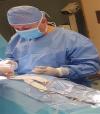What Does This MRI Report Indicate?

Another word for nerve compression.
Detailed Answer:
Hello and thanks for using HCM.
I have read your question and understand your concerns.
Nerve effacement is a term used to describe nerve root compression.
Nearly total effacement means that the S1 nerve is compressed heavily by another structure such intervertebral disc, fibrosis (or scar tissue), bone spur etc.
In this case the nerve looses its functions leaving the muscles and skin that it supply without innervation resulting in muscles atrophy, loss of sensation ( touch, pain, temperature ) in the supplied area.
The degree of the nerve function can be measured by nerve conduction study and electromyography.
The main aim of surgery in cases of nerve compression and herniated disc disease is to reduce pain and reduce further deterioration, so, if you were free of pain after the surgery, it is not completely failed surgery, even though it didn't restore the complete nerve functionality.
Hope you found the answer helpful.
Let me know if I can assist you further.
Greetings.

Those symptoms may be explained by nerve compression.
Detailed Answer:
Welcome back.
Nerve damage could result in muscle weakness and dysfunction, so, this condition can cause movement difficulties such those mentioned by you.
I think, raised toilet seat may help you getting up from toilet more easily and start walking sooner.
Hope I helped you.
Best regards.
Answered by

Get personalised answers from verified doctor in minutes across 80+ specialties



